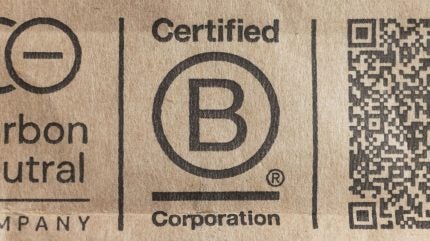
B Lab, the non-profit organisation responsible for B Corp certification, has unveiled new standards.
Described as the “most significant evolution” since B Lab’s founding in 2006, the updated B Corp standards include the adoption of climate action plans aligned with the 1.5°C goal.

Discover B2B Marketing That Performs
Combine business intelligence and editorial excellence to reach engaged professionals across 36 leading media platforms.
“As the climate crisis intensifies and societal inequality grows, the standards provide companies with clarity on how they can take meaningful and tangible action on issues facing people and the planet,” B Lab said.
According to the organisation, nearly 10,000 companies across 100 countries and 160 industries hold B Corp status.
However, the scheme had faced criticism. Last month, UK pet-food business Scrumbles went public with its decision not to renew its certification. In a post on LinkedIn, co-founder Aneisha Soobroyen wrote: “While we were proud to be one of the first pet food brands to certify in 2019, the certification no longer holds the weight it once did. It has started to feel like little more than a marketing badge and greenwashing rather than a true mark of ethical business.”
Just Food asked B Lab for its position on those comments. In the statement announcing the new standards, Clay Brown, co-lead executive of B Lab Global, called the new standards “a complete reimagining of business impact to respond to the challenges of our time”.

US Tariffs are shifting - will you react or anticipate?
Don’t let policy changes catch you off guard. Stay proactive with real-time data and expert analysis.
By GlobalDataPreviously, companies seeking certification underwent an assessment process involving a ‘B Impact’ assessment form, which evaluated their environmental, worker, material, community, and governance practices.
To achieve certification, a company needed to score 80 or above out of 200.
To maintain certification, B Lab mandates that companies re-certify every three years by completing a ‘B Impact Assessment’ and submitting documentation for evaluation.
The updated framework introduces a shift from scoring to meeting baseline performance requirements across seven key “impact topics”: purpose and stakeholder governance; climate action; human rights; fair work; environmental stewardship and circularity; justice, equity, diversity, and inclusion; and government affairs and collective action.
Judy Rodrigues, B Lab Global’s director of standards, explained the update follows a four-year process involving two rounds of public consultation and the review of 26,000 feedback submissions from companies, the general public, and subject-matter experts.
She added: “We are confident that the new standards are clear, ambitious, and truly capable of raising the bar for businesses worldwide.”
The seventh version of the standards also introduces differentiation based on company size. Larger companies – defined as having between 250 and 999 employees or $75m to $350m in annual revenue – face more rigorous requirements.
Companies with 1,000 to 9,999 employees, or $350m to $1.5bn in annual revenue, are subject to even stricter criteria.
According to a statement on B Lab’s website, larger companies “generally have to answer more (and more difficult) questions and meet higher requirements for verification, transparency, and additional factors in order to certify”.
On LinkedIn, Emma Aberg of UK-based consultancy Greenheart, welcomed the update, saying: “This is really great news in my opinion as it keeps B Corps where they should be; a true force for good in the world and the business leaders shaping our path towards a sustainable and regenerative future.”





